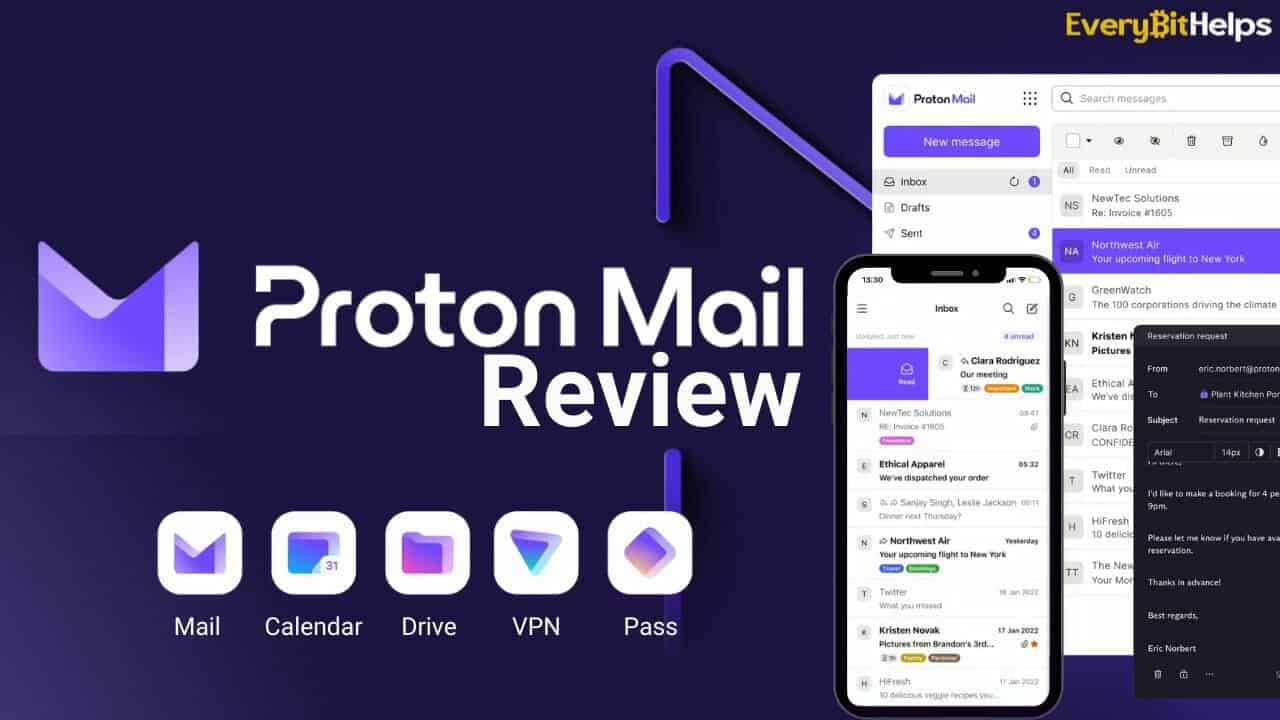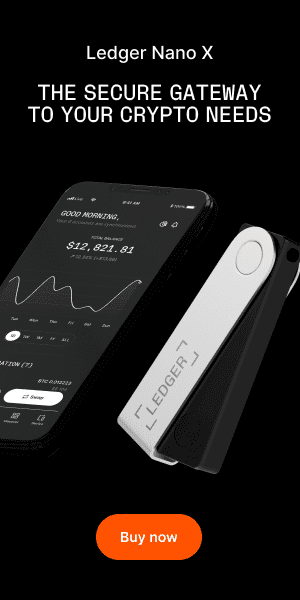In this ProtonMail review, we take a deep dive into the privacy and security-focused ProtonMail. Providing you with an insight into Proton’s unique features, products and pricing tiers.
In an era where safeguarding personal data and ensuring online security are paramount, your choice of email service can significantly impact your digital safety. This is where Proton Mail, a leading encrypted email provider, comes into the frame.
Whether you’re an individual who values privacy or you’re seeking a secure platform for confidential communication, our in-depth analysis will guide you. Join us as we explore ProtonMail, equipping you with all the necessary information to make a well-informed decision.
ProtonMail Review

What is ProtonMail?
Proton Mail is a private open-source email service based in Geneva, Switzerland and was founded by Proton AG in 2014. Proton Mail is designed with privacy and security at its core. It offers robust encryption and protection against legal demands for user data, all while being accessible through multiple platforms.
One of the key features of ProtonMail is its use of end-to-end encryption, which ensures that only the intended recipient of an email can read its contents. This encryption is implemented on the client side, meaning that the email content and user data are encrypted before being sent to Proton Mail servers. This approach differs significantly from other popular email providers like Gmail and Outlook.com, which do not use client-side encryption.
ProtonMail also employs a concept called “zero-access encryption,” which ensures that not even Proton Mail can access your emails. This feature is instrumental in the event of a data breach, as the data stolen from ProtonMail’s servers would be rendered useless without the key to decrypt it.
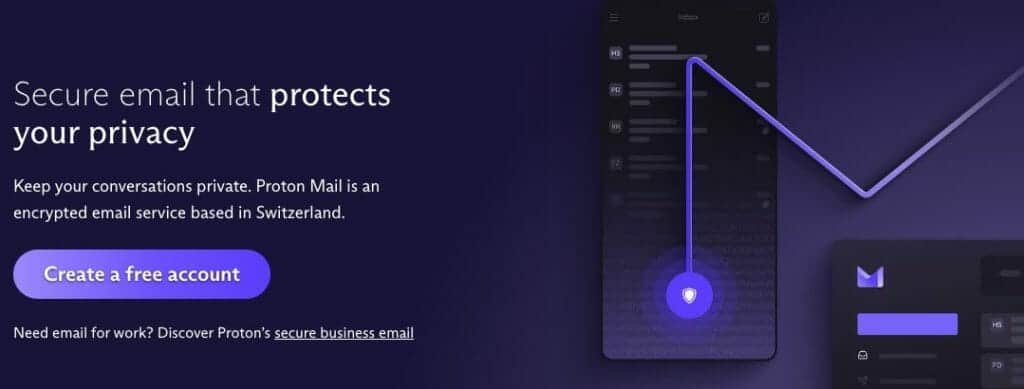
ProtonMail Pros & Cons
ProtonMail has a number of significant pros and cons that can influence your decision to use its service. Remember, these pros and cons will depend on your individual needs and circumstances.
Pros:
- Security and Privacy: ProtonMail provides high levels of privacy and security, with both end-to-end encryption and zero-access encryption in place. This ensures that no one else, including Proton Mail staff, can read your emails.
- Ease of Use: The service has a modern and user-friendly interface, making it easy to use even for those unfamiliar with encrypted email services.
- Import Options: You can import mail and contacts from other services such as Gmail, Yahoo, Outlook and other email services, simplifying the switch to ProtonMail.
- Jurisdiction and Data Storage: Proton Mail’s Swiss jurisdiction offers robust privacy protection, and all data is stored on servers in Switzerland.
Cons:
- Limited Free Plan: ProtonMail’s free account is limited in terms of storage (1GB) and features, and some advanced features may require a paid plan. However, even a free plan offers the same level of encryption and security as the paid one.
- Not Designed for High-Volume: ProtonMail may not be the best choice for users who sends a large volume of emails daily.
- Potential for Lost Access: Since ProtonMail doesn’t hold the keys to decrypt your data, you may lose access to your emails if you lose your password.
Who are Proton AG?
Proton AG is a Swiss technology company known for offering privacy-focused online services. The company was founded in 2014 by a group of scientists who met at CERN, the European Organization for Nuclear Research.
The first product they created was Proton Mail, an encrypted email service designed to prioritize user privacy. Since then, Proton AG has grown to include several other privacy-centred products like Proton VPN, Proton Drive, and Proton Calendar.
The company prides itself on a core belief that data belongs to the users, not tech companies, governments, or hackers. This ethos underlies all of Proton AG’s services, which aim to protect freedom and privacy online.
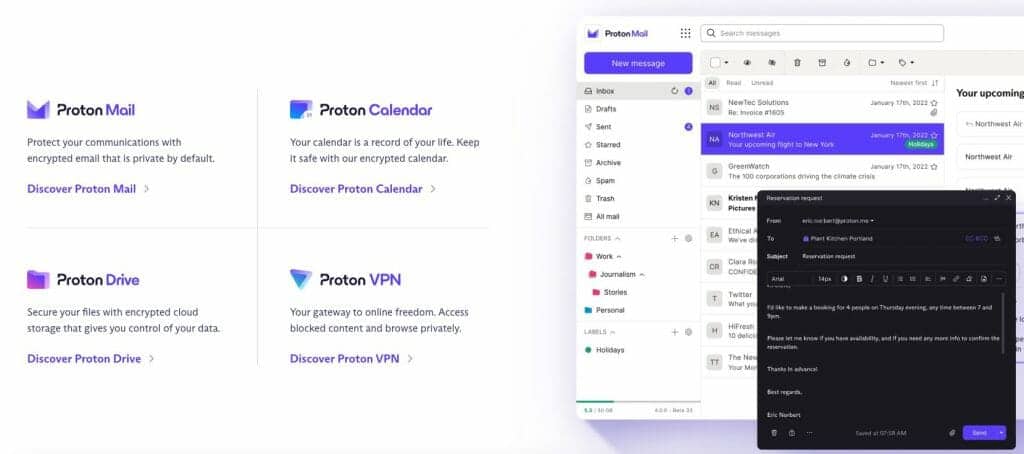
Proton Products
Proton, a pioneer in the field of digital privacy and security, consistently innovates by expanding its product suite beyond its flagship service, ProtonMail. Proton Pass is the latest addition to its list of features, a cutting-edge password manager currently in beta testing. With this steady stream of developments, Proton remains committed to providing secure and privacy-focused solutions for modern digital needs.
Proton Calendar
ProtonCalendar is a secure, privacy-focused calendar application developed by Proton. It’s designed to help you manage your schedule while safeguarding your data. Applications are available for Android, iOS, and the web, ensuring that your Proton Calendar is always in sync across all your devices.
One of the key features of ProtonCalendar is its seamless integration with Proton Mail. You can manage invitations directly from your ProtonMail inbox, quickly adding events received by email, such as flights, meetings, or concerts. The application also allows you to create, edit, delete, and export custom calendars according to your needs.
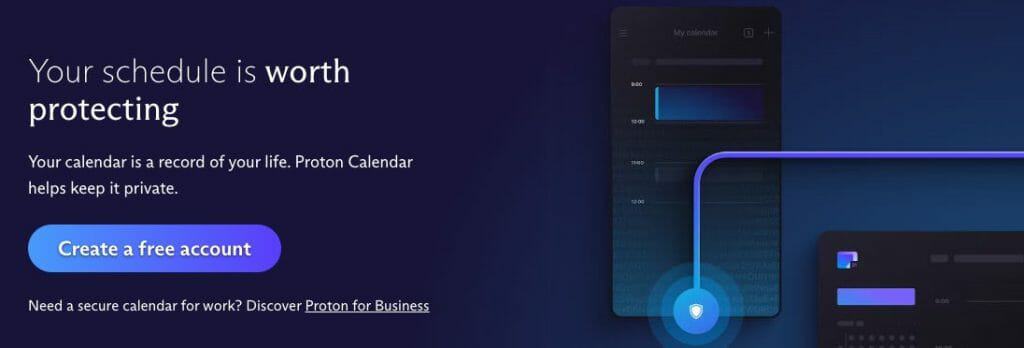
Proton Drive
ProtonDrive is a secure, innovative end-to-end encrypted cloud storage service developed by Proton. Like other Proton services, the main selling point of ProtonDrive is its emphasis on security and privacy. The service protects all data with strong end-to-end encryption, making it a suitable option for securing sensitive documents.
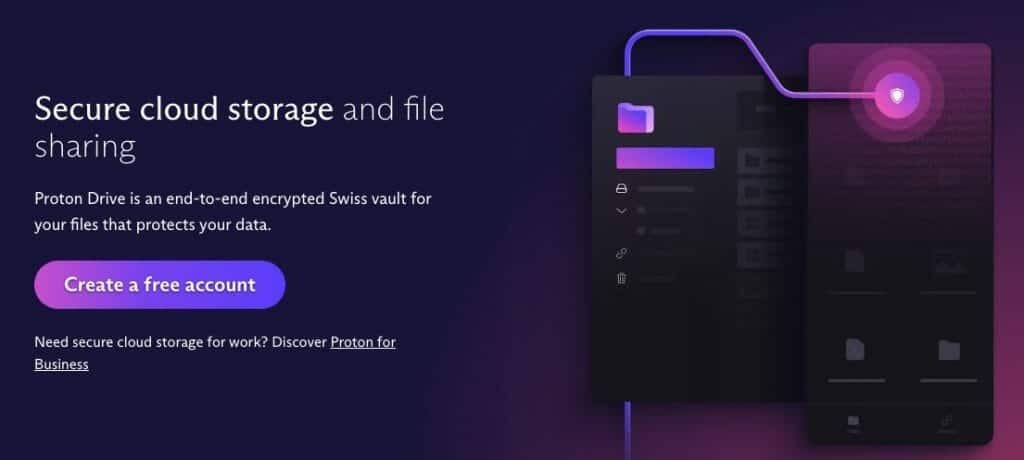
Proton VPN
ProtonVPN is a Virtual Private Network (VPN) service operated by Proton. With ProtonVPN, your online activity is shielded from your internet service provider and the websites you visit, protecting your real IP address. It also prevents public WiFi hosts from tracking your browsing habits and selling this information to advertisers. ProtonVPN can also protect you from WiFi hackers when using insecure public hotspots.
This service is also effective at bypassing censorship. If certain content is blocked in your country, school, or workplace, ProtonVPN can help you access it by connecting to a server located somewhere where the content is not blocked.
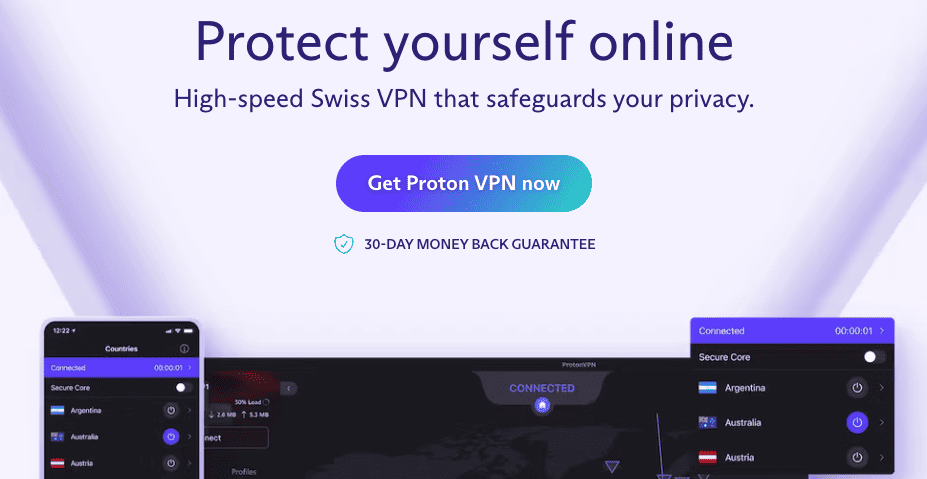
Proton Pass
Proton Pass is a pioneering password manager developed by Proton in collaboration with SimpleLogin, which became a part of Proton in 2022. Constructed with the principles of end-to-end encryption, ProtonPass provides enhanced security for storing login credentials.
A significant aspect that sets ProtonPass apart from other password managers is its in-built two-factor authenticator (2FA) and the support for 2FA autofill. This integration of 2FA is intended to boost the security of online accounts and make it more straightforward to use 2FA across various platforms.
One of the other noteworthy features of ProtonPass is its ability to create unique email aliases that can replace your regular email address. This level of security underscores its stand as the first password manager developed by a company focused solely on encryption and privacy.
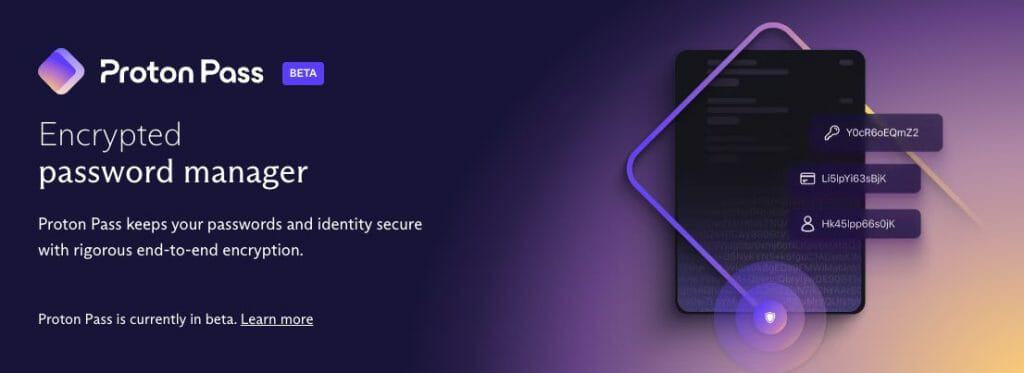
Proton Mail Security
When it comes to email security, ProtonMail sets itself apart from the crowd. Central to its offering is end-to-end encryption. This means sending an email from your Proton Mail account is locked (or encrypted) so that only the intended recipient can unlock (or decrypt) and read it. This is like sending a letter in a secure box that can only be opened with a unique key held only by the recipient.
Interestingly, this encryption happens on your device before the email even leaves for its journey through the internet, so ProtonMail doesn’t have access to your messages. This is what makes ProtonMail’s encryption ‘client-side’. It’s different from traditional email providers like Gmail or Outlook, where the service provider can read your messages.
Adding another layer of protection, Proton Mail also employs ‘zero-access encryption’ for your mailbox. This means that all your emails, whether sent, received, or drafted, are encrypted so that even ProtonMail can’t decrypt them. Only you can because only you have the unique keys to do so. This ensures that your emails remain private and secure, even if someone were able to access ProtonMail’s servers.
In contrast to other email services, ProtonMail is based in Switzerland, a country known for its strict privacy laws. This jurisdiction means that Proton Mail can’t be forced to hand over user data to any authorities outside of Switzerland.
ProtonMail also doesn’t require any personal identifying information to create an account. This further enhances user privacy and differentiates Proton Mail from other email providers, who often track and store this kind of information. For users with heightened privacy needs, Proton also provides an onion site for anonymous access (Proton is one of the only email providers that supports this).
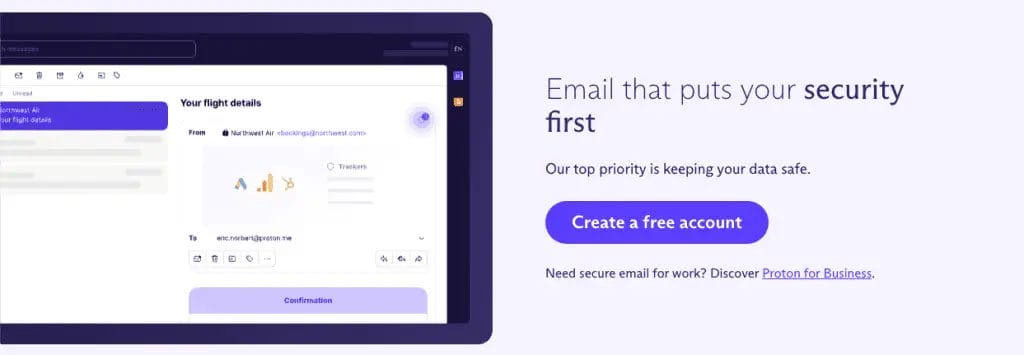
Is ProtonMail Safer than Gmail?
Yes, ProtonMail is generally considered to be safer than Gmail in terms of data protection. ProtonMail’s security advantage primarily stems from its use of end-to-end encryption for all stored data. This means that no one, including hackers or even Proton Mail employees, can read the contents of your messages.
Proton Mail is the world’s largest end-to-end encrypted email service, with over 100M users. While Gmail does provide strong security measures, it doesn’t provide this level of encryption, and it keeps logs of user logins and can access every single email in your mailbox.

Can ProtonMail be Trusted?
ProtonMail is generally considered a trustworthy email service provider. Trust in software and online services often hinges on their ability to maintain privacy and security, and Proton Mail prioritizes these factors heavily in its service design.
One of the main reasons Proton Mail is considered trustworthy is due to its robust security measures. ProtonMail offers end-to-end encryption, which means that your emails are fully encrypted when sent over the internet, preventing unauthorized access to your email content.
Importantly, this level of encryption means that not even Proton Mail itself can access your email content or sensitive data like your IP address. This contrasts with other email providers, such as Gmail, which may track and keep logs of your IP addresses.
How Much Does ProtonMail Cost?
ProtonMail offers several different plans, each with its own set of features and costs. The costs are presented in Euros, and the equivalent value in other currencies will depend on the current exchange rates.
| Proton Mail Plans | 1 Month | 12 Months | 24 Months | Included Features |
|---|---|---|---|---|
| ProtonMail Free | n/a | n/a | n/a | – Encrypted email – 150 Messages per day – 1 Email Address – 1 GB storage – 3 Calendars – 1 Medium Speed VPN |
| ProtonMail Plus | €4.99/month | €47.88/year (€3.99/month) | €83.76/2 years (€3.49/month) | – Encrypted email – Unlimited Messages per day – 10 Email Addresses – 1 Custom Email Domain – 15 GB storage – 25 Calendars, Plus Sharing – 1 Medium Speed VPN |
| ProtonMail Unlimited | €11.99/month | €119.88/year (€9.99/month) | €191.76/2 years (€7.99/month) | – Encrypted email – Unlimited Messages per day – 15 Email Addresses – 3 Custom Email Domain – 500 GB storage – 25 Calendars, Plus Sharing – 10 High-Speed VPN Connections |
| ProtonMail Family | €29.99/month | €287.88/year (€23.99/month) | €479.76/2 years (€19.99/month) | – Up to six family members – Each with an Encrypted email – All Proton services – 3TB of Storage Space |
| ProtonMail Essentials Business | €7.99/month | €6.99/month | €6.49/month | – 10 Email Addresses per User – 3 Custom Email Domains – Contact Group Management – 1 VPN Connection – 15 GB Storage |
ProtonMail Free vs Paid
Proton offers both free and paid ProtonMail accounts, which provide secure, encrypted email services. However, paid plans offer additional features and increased storage. Choosing between a free and a paid Proton Mail account depends largely on individual requirements and budgets.
ProtonMail Free Plan
Proton Mail Free: This plan is designed to bring encrypted email to everyone worldwide, especially those who cannot afford to pay. This plan offers the same level of security and ease of use as the paid plans.
Proton Mail Paid Plans
Several paid plans are available for those willing and able to pay for ProtonMail services.
Proton Mail Plus: This plan costs €4.99/month, or €47.88 for one year (€3.99/month), or €83.76 for two years (€3.49/month). It includes a number of advanced features, such as support for one user with 10 email addresses, 15 GB of total storage shared with Proton Drive, and support for one custom email domain.
Proton Mail Unlimited: This plan costs €11.99/month, or €119.88 for one year (€9.99/month), or €191.76 for two years (€7.99/month).
Proton Mail Family: This plan is tailored for families and provides up to six family members with access to all Proton services, including encrypted email, calendar, VPN, and secure storage. Each family member gets their own encrypted email address, calendar, secure file storage, and VPN. The family shares a total of 3TB of storage space.
Proton Mail Business: This plan is designed for businesses, offering scalability and security without requiring any upfront server costs or long-term contracts. The Business plan offers Proton’s suite of secure services, which can be expanded as the business grows. Each user in the business plan has access to these services, including encrypted email, calendar, VPN, and secure storage.
ProtonMail Alternatives
Choosing the right email service is crucial in the digital age, where communication primarily happens through emails. While ProtonMail has made its mark as a secure and encrypted email service, it’s not the only player in the field. Other email service providers are available, each with unique strengths and offerings catering to diverse user needs.
For instance, Gmail, a product from tech giant Google, is a mainstream choice that offers vast storage, powerful search features, and seamless integration with other Google services. Microsoft’s Outlook provides comprehensive email management tools and integrates smoothly with the company’s suite of productivity apps, making it a favourite for businesses and individuals alike.
On the other hand, if privacy and security are your top concerns, Tutanota might be an excellent choice. Tutanota provides end-to-end encryption for emails and attachments, ensuring that your data remains secure and private. Its focus on security makes it stand out among its peers.
ProtonMail vs Gmail

ProtonMail and Gmail, while both being recognized email services, cater to contrasting requirements and priorities.
Concerning user-friendliness, both Proton Mail and Gmail shine, offering intuitive and straightforward interfaces. However, when security and privacy come into play, ProtonMail takes the lead. Its commitment to privacy is reflected in its use of end-to-end encryption and zero-access encryption, rendering user data inaccessible even to Proton Mail’s own servers. Google, on the other hand, whilst offering free accounts, makes money by tracking movements online and sharing your personal data with advertisers.
Additionally, the fact that ProtonMail is headquartered in Switzerland, a country renowned for its stringent privacy laws, further underscores its commitment to data privacy.
Contrastingly, Gmail offers a broad spectrum of features tailored towards personal use and productivity. While Proton Mail focuses on providing secure email service, Gmail’s expansive feature set includes tasks, calendars, and note-taking utilities. One substantial advantage of Gmail is its seamless integration with other Google services and a myriad of third-party apps, potentially enhancing the user experience for those deeply embedded in the Google ecosystem or reliant on such integrations.
The decision between ProtonMail and Gmail primarily hinges on the user’s personal or business priorities. Proton Mail presents a compelling choice for those who value privacy and security above all else, giving your privacy by default.
Conversely, if the user prioritizes a wide array of features, extensive integrations, and substantial storage space, Gmail stands out as a more fitting option.
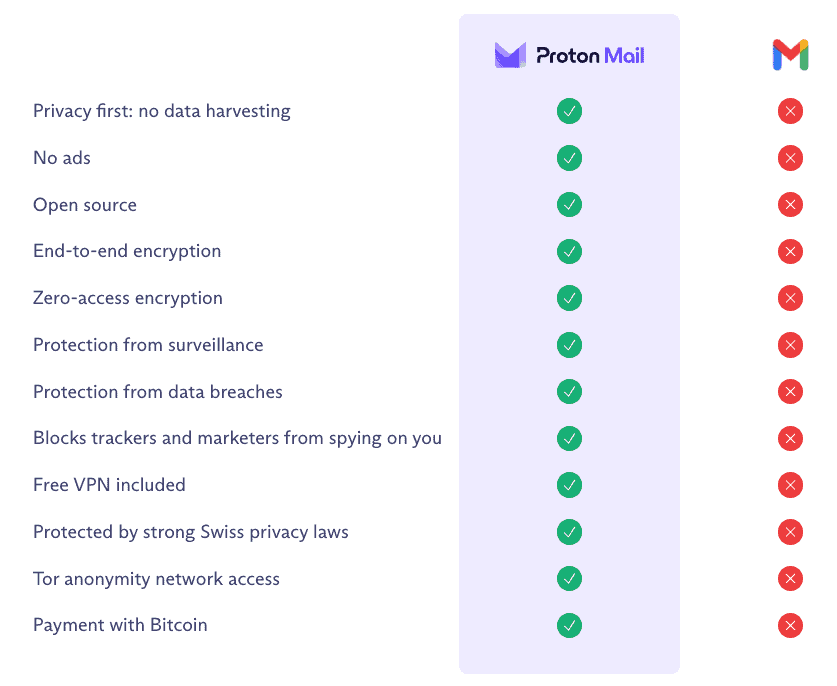
Who Uses ProtonMail?
ProtonMail is used by individuals who value privacy and security in their email communications. Proton Mail can be particularly beneficial for people who wish to ensure that their emails cannot be read by anyone else, including the email service provider itself.
Because ProtonMail doesn’t require any identifying information to create an account and user activity is not logged by default, it’s often used by people who wish to stay anonymous.
With Proton Mail being based in Switzerland, which has strict privacy laws, it can’t be forced to hand over data to authorities in countries like the U.S. This aspect makes it a popular choice among users who are concerned about their email data being accessed by government agencies.
It’s important to note that the secure nature of Proton Mail doesn’t mean it’s only for people who are involved in sensitive activities. Anyone who prefers a more private alternative to common email providers such as Gmail and Outlook can use ProtonMail.
Why Would Someone Want to Use ProtonMail?
You might wonder why you’d want to use ProtonMail when there are other, more commonly used email services out there like Gmail. Well, Proton Mail is like having a private conversation in a crowded room without anyone else overhearing you. You know that your conversation (or, in this case, your email) is private and secure.
This is especially important if you share sensitive information, like personal details or important business documents. But even if you’re just emailing a friend, wouldn’t it be nice to know that your conversation remains just between the two of you? That’s the privacy ProtonMail offers.
Conclusion
Proton Mail distinguishes itself as a robust contender in the realm of secure email services. Its commitment to privacy is bolstered by its Swiss base and zero-access encryption methodology. This particularly appeals to users prioritizing security. However, its appeal might be somewhat muted for those seeking broader features and integrations typically found in more mainstream services such as Gmail.
While every service has pros and cons, ProtonMail’s strong focus on security and privacy makes it a worthy consideration in the current landscape, where these aspects are increasingly sought. Remember that your online security is a shared responsibility, and secure practices go a long way in maintaining digital safety.
FAQs
Where is ProtonMail Located?
ProtonMail is located in Geneva, Switzerland, a country known for its strict privacy laws. ProtonMail is not obligated to hand over user data to US authorities or other members of the “Five Eyes” intelligence-sharing agreement.
Does ProtonMail Accept Bitcoin as Payment?
Yes, ProtonMail does accept payment in Bitcoin.
What are Protonmail custom domains?
ProtonMail’s custom domains feature allows users to use their own domain name for their email address instead of the default “@protonmail.com”. This means that instead of having an email address like “yourname@protonmail.com“, you could have “yourname@yourdomain.com“.
This feature is particularly useful for businesses and professionals who want to maintain a consistent brand image across their communications. It allows them to combine the security and privacy benefits of ProtonMail with the professional appearance of a custom domain.
To use a custom domain with ProtonMail, you need to have a paid ProtonMail account and own a domain name. You then configure the domain’s DNS settings to point to ProtonMail’s servers. Once this is done, you can send and receive emails using your custom domain through ProtonMail’s platform.

